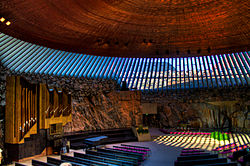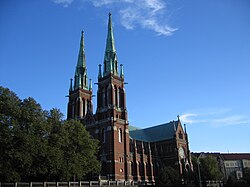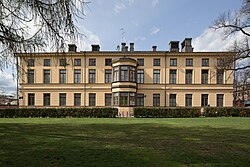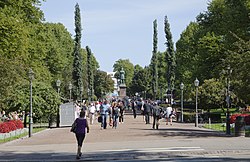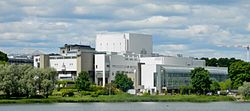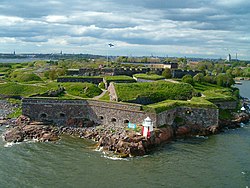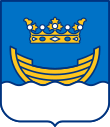
Finland, officially the Republic of Finland, is a Nordic country in Northern Europe. It borders Sweden to the northwest, Norway to the north, and Russia to the east, with the Gulf of Bothnia to the west and the Gulf of Finland to the south, opposite Estonia. Finland covers a total area of 338,145 square kilometres (130,559 sq mi), including a land area of 303,815 square kilometres (117,304 sq mi), and has a population of 5.6 million. Helsinki is the capital and largest city. The vast majority of the population are ethnic Finns. The official languages are Finnish and Swedish; 84.9 percent of the population speak the first as their mother tongue and 5.1 percent the latter. Finland's climate varies from humid continental in the south to boreal in the north. The land cover is predominantly boreal forest biome, with more than 180,000 recorded lakes.

Helsinki is the capital and most populous city in Finland. It is on the shore of the Gulf of Finland and is the seat of southern Finland's Uusimaa region. About 675,000 people live in the municipality, with 1.25 million in the capital region and 1.58 million in the metropolitan area. As the most populous urban area in Finland, it is the country's most significant centre for politics, education, finance, culture, and research. Helsinki is 80 kilometres (50 mi) north of Tallinn, Estonia, 360 kilometres (220 mi) north of Riga, Latvia, 400 kilometres (250 mi) east of Stockholm, Sweden, and 300 kilometres (190 mi) west of Saint Petersburg, Russia. Helsinki has significant historical connections with these four cities.

Finland attracted over 6.8 million foreign tourists in 2018, with 53 percent coming from other European Union states. In 2017, the value added by tourism was about 4.6 billion euros, or 2.6% of the Finnish GDP, providing approximately 140,200 jobs.

Rovaniemi is a city in Finland and the regional capital of Lapland. It is located near the Arctic Circle in the northern interior of the country. The population of Rovaniemi is approximately 65,000, while the sub-region has a population of approximately 69,000. It is the 17th most populous municipality in Finland, and the 12th most populous urban area in the country.

Nasdaq Helsinki, formerly known as the Helsinki Stock Exchange, is a stock exchange located in Helsinki, Finland. Since 3 September 2003, it has been part of Nasdaq Nordic. After the OMX merger, it was referred to as OMX Helsinki (OMXH), then after NASDAQ's acquisition of OMX in February 2008, NASDAQ OMX Helsinki, and currently Nasdaq Helsinki.

Karelia is an area in Northern Europe of historical significance for Russia, Finland, and Sweden. It is currently divided between northwestern Russia and Finland.
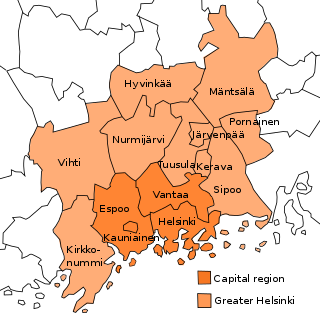
Helsinki metropolitan area or Greater Helsinki is the metropolitan area around Helsinki, the capital city of Finland. It also includes the smaller capital region. The terms Helsinki metropolitan area, Greater Helsinki, Capital region and the other terms used are not fixed and may vary in different contexts.
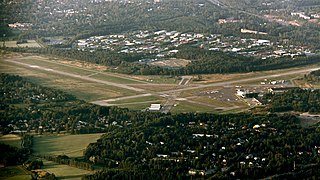
Helsinki-Malmi Airport was an airfield that served Helsinki, the capital of Finland, located in the district of Malmi, 5.4 NM north-north-east of the city centre. It was opened in 1936. Until the opening of Helsinki-Vantaa Airport in 1952, it was the main airport of Helsinki and of Finland. After that, it was used for general aviation and flight training, and remained the second-busiest airport in Finland, as measured by the number of landings, after Helsinki-Vantaa Airport. The city of Helsinki, which owns the land the airport is located on, terminated its lease agreement for aviation purposes in December 2019, and its remaining runway was closed in March 2021, but several legal complaints are pending in courts. The city plans to use the land for the construction of approximately 25,000 new apartments starting in 2024. The airfield area, including the runways and taxiways, was opened for public recreation in February 2022.
The Official Finnish Charts are national record charts in Finland compiled and published by Musiikkituottajat – IFPI Finland. The name Suomen virallinen lista/Finlands officiella lista, which is singular in both Finnish and Swedish, is used generically to refer to both the albums and the singles chart, and the context reveals which chart is meant.

Haaga-Helia University of Applied Sciences is one of Finland's largest universities of applied sciences. The institution is fully supervised and accredited by the Finnish government through the Ministry of Education and Culture. The university's primary facilities are in Pasila, Helsinki. It has other premises in Haaga, Malmi, and in Porvoo and Vierumäki.

The following outline is provided as an overview of and topical guide to Finland.
The 2001 season was the 71st completed season of Finnish Football League Championship, known as the Veikkausliiga. At the same time it was the 12th season of the Veikkausliiga.
The 2003 season was the 73rd completed season of Finnish Football League Championship, known as the Veikkausliiga. At the same time it was the 14th season of the Veikkausliiga.

Finland–Spain relations are the bilateral relations between Finland and Spain. Both nations are members of the Council of Europe, the European Union, the United Nations, the Schengen Area, the eurozone, and NATO. Spain strongly supported Finland's NATO membership during the latter's accession process. Spain is also one of the favorite destinations of Finnish tourism. Approximately ten percent of the Finnish population travels on vacation each year to Spain. Furthermore, the Finns are the fastest growing European community in Málaga, as Fuengirola is home to the second largest colony of Finns in the world, after Sweden.
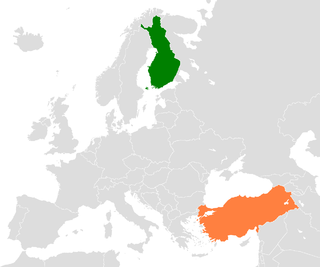
Finland–Turkey relations are foreign relations between Finland and Turkey. Finland has an embassy in Ankara and an honorary consulate general in Istanbul and other honorary consulates in Adana, Alanya, Antalya, Belek, Bodrum, İzmir, and Kayseri. Turkey has an embassy in Helsinki. Both countries are full members of the Council of Europe, the Organisation for Economic Co-operation and Development (OECD), the Organization for Security and Co-operation in Europe (OSCE), North Atlantic Treaty Organization (NATO), and the Union for the Mediterranean. Also Finland is an EU member and Turkey is an EU candidate. Turkey did not support Finland's accession to NATO until March 2023, but accepted its participation.
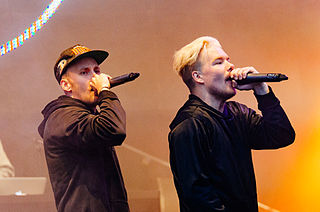
JVG is a Finnish rap duo made up of Jare Joakim Brand and Ville-Petteri Galle.
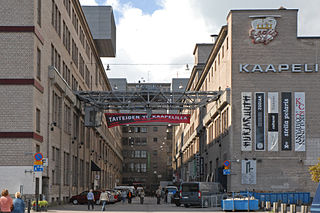
The Hotel and Restaurant Museum specializes in the history of Finnish hotels, restaurants, cafés, tourism and culinary culture. The museum is located in Kaapelitehdas, Helsinki, Finland. The museum was first opened in 1971 but has operated in its present premises since 1993. The museums collection includes about 20,000 artifacts and other objects from restaurants, bars, diners, spas and hotels. Museum's archives include about 38,000 photographs, menus and other documents. Museum also takes care of the Alko store museum's collection.

Finland–Malaysia relations are foreign relations between Finland and Malaysia. Finland has an embassy in Kuala Lumpur, and Malaysia has an embassy in Helsinki.

The Haaga Rhododendron Park is a public park containing various varieties of rhododendron, located in the district of Haaga in Helsinki, Finland. Although originally used for breeding and research purposes, the park is now a popular attraction among locals.

Alppikylä is a neighborhood in the northeastern part of Helsinki, Finland. It is located between the Tattarisuo neighborhood and the Helsinki–Lahti Highway (E75), near the Helsinki–Malmi Airport. It is classified as belonging to the Suurmetsä district. At the beginning of 2017, the area had a population of 1,478.








